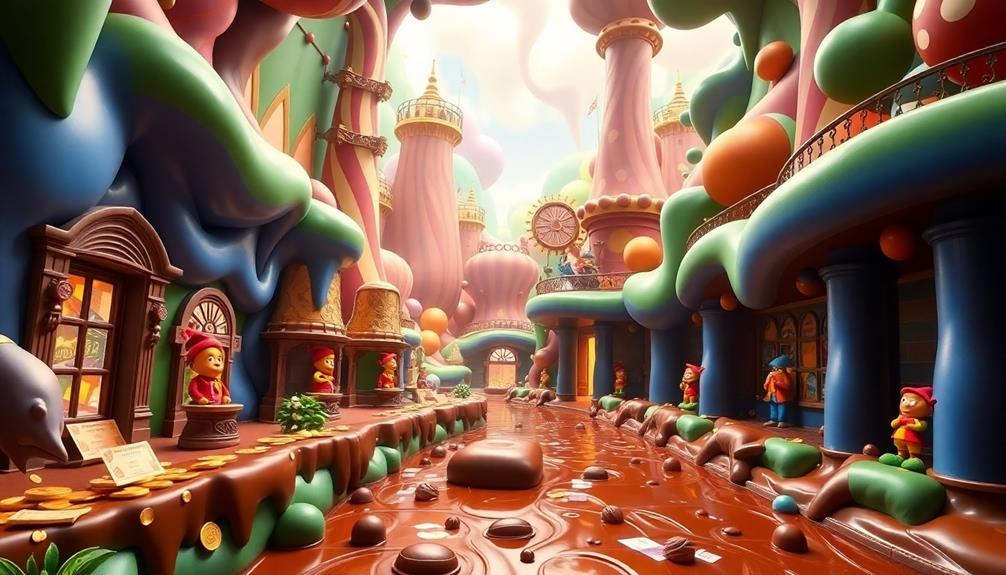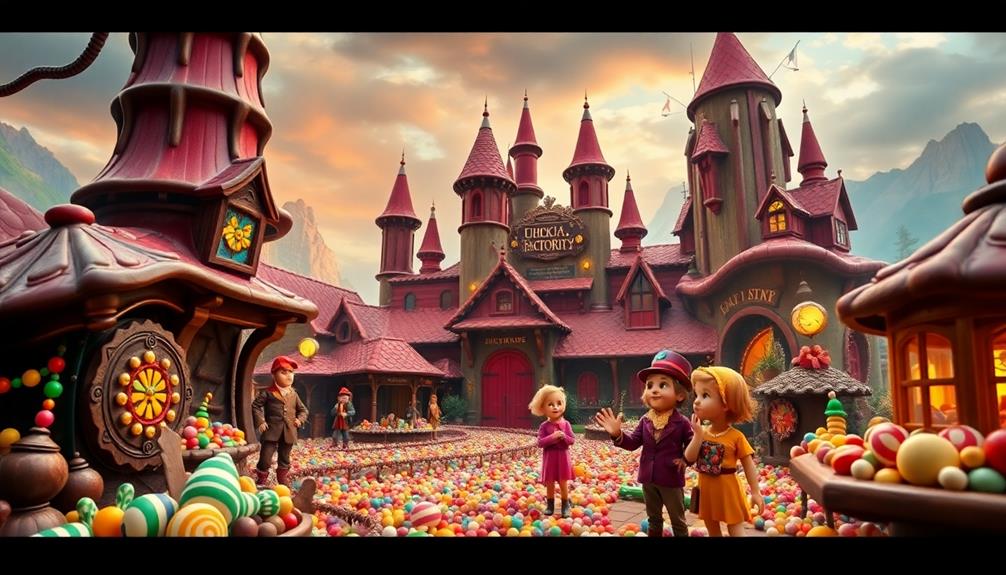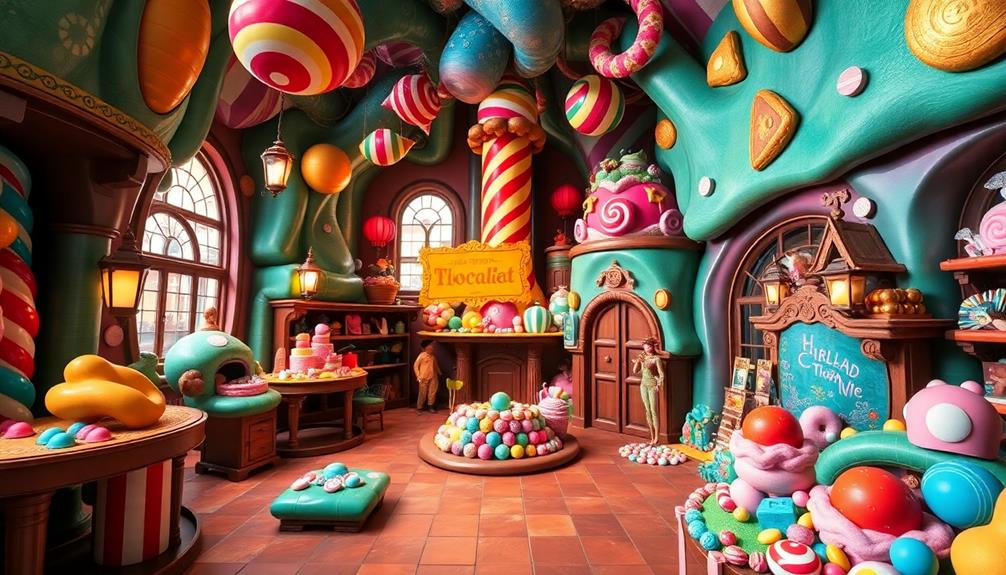Roald Dahl's imaginative genius and rich personal history shaped "Charlie and the Chocolate Factory." His early fascination with sweets and whimsical dreams drove his storytelling. Charlie Bucket's journey of humility contrasts with his peers' greed, delivering powerful moral lessons. Willy Wonka, with his eccentricity, serves as both a mentor and a challenge to the children, adding depth to the tale. The book's success ignited numerous adaptations, solidifying its place in popular culture. Dahl's blend of fantasy and morality resonates across generations, and there's so much more behind this iconic story that might just surprise you.
Roald Dahl's Early Inspirations
From his early days at Repton School, Roald Dahl's imagination was ignited by the delightful world of chocolate. Surrounded by the tantalizing samples from Cadbury, he found himself dreaming of a whimsical chocolate factory where he could invent his own confections.
This childhood fascination with sweets became a powerful inspiration for his storytelling, reflecting the symbolism of food and emotional impact seen in literature. Dahl envisioned a secret inventing room filled with magical treats, and this dream would later permeate his writing. The fantastical elements in his stories reflect the joy and wonder he experienced as a child, sparking his creativity. His experiences with chocolate and candy not only shaped his literary voice but also laid the groundwork for the enchanting worlds he created.
After leaving Repton, Dahl's journey took him through various professions, including working for Shell Oil and serving in the Royal Air Force.
These diverse experiences broadened his perspective, fueling his creativity. Encouraged by British novelist C.S. Forester, he began writing in Washington, D.C., allowing him to channel those early inspirations into narratives filled with magic and whimsy.
It's clear that Dahl's love for chocolate played a pivotal role in crafting the unforgettable tales we cherish today.
The Creation of Charlie
In crafting "Charlie and the Chocolate Factory," Roald Dahl channeled his childhood wonder and personal experiences into the character of Charlie Bucket. You see, Charlie embodies humility and kindness, setting him apart from the other children vying for the golden tickets.
Dahl drew inspiration from his own youth spent at Repton School, where the joys of chocolate and sweets sparked his imagination. Charlie's journey mirrors the epic quests found in fantasy adventures, where young heroes navigate magical domains filled with vibrant landscapes and hidden dangers, making his story relatable to those familiar with epic quests and magical domains.
Charlie's journey through the magical chocolate factory serves as a poignant backdrop for his character development. Unlike the other ticket winners, he demonstrates respect and integrity, which ultimately leads to his triumph.
Dahl's personal tragedies, including the loss of his daughter Olivia and the injury of his son Theo, added emotional depth to the narrative. These experiences shaped Charlie's resilience and grounded the story in real human emotions.
Themes and Moral Lessons

Throughout "Charlie and the Chocolate Factory," numerous themes and moral lessons emerge, each illustrating the significance of character in shaping one's destiny. You see Charlie Bucket's humility and kindness shine brightly against the backdrop of his peers' entitlement and greed. This stark contrast emphasizes how good character ultimately leads to rewards, as Charlie inherits the chocolate factory.
In a similar vein, the resilience showcased in stories of women overcoming adversity highlights the transformative power of character in the face of challenges, demonstrating that strength and determination can lead to hope and triumph impactful narratives of resilience.
The story cleverly showcases the consequences of negative traits through the bizarre punishments faced by the flawed children. For example, Augustus Gloop's gluttony leads him to fall into the chocolate river, serving as a vivid reminder of how selfishness can lead to dire outcomes.
The Oompa-Loompa songs throughout the narrative reinforce this message, critiquing the character flaws of the children and delivering moral lessons about respect and integrity.
As you read, you'll find that the themes of kindness and humility resonate throughout, making the book relatable for readers of all ages. Dahl's timeless message about the value of good character serves as a reminder that our choices shape our futures, encouraging you to embrace qualities like selflessness and patience.
Willy Wonka's Complex Character
Willy Wonka's character is undeniably complex, blending eccentricity with a sense of mystery that keeps you engaged. Roald Dahl crafts him as an unpredictable figure, embodying creativity within his fantastical chocolate factory. Each quirk and whimsical invention serves as a reflection of his imaginative personality, making you wonder about his true intentions.
Much like the richly detailed universe in Dune, Wonka's world is filled with intricate layers and moral complexities that provoke thought and discussion.
As you journey through the factory, you realize that Wonka acts as a moral guide for the children who enter. He tests their character, exposing flaws like greed and entitlement while showcasing the virtues of kindness and humility. It's fascinating how he orchestrates these lessons, blending fun with serious undertones.
While many children falter under the pressure of their own shortcomings, Charlie Bucket stands out. His humility and genuine spirit resonate with Wonka, who ultimately deems him worthy of inheriting the factory.
This decision underscores the importance Wonka places on good character, proving that imagination and morality can coexist. Fundamentally, Willy Wonka isn't just a whimsical chocolatier; he's a complex character who challenges you to think about what it truly means to be deserving of success.
Reception and Adaptations

The reception of *Charlie and the Chocolate Factory* has been an intriguing journey since its debut in 1964. Initially a bestseller in the U.S., the book faced delays in Britain until 1967 due to controversy over its content. Roald Dahl's whimsical yet cautionary tale about a young boy and his adventure in Willy Wonka's magical factory quickly became a beloved children's classic, enchanting readers with the allure of the golden ticket.
The themes of resilience and personal growth echo those found in classic literature, such as Dickens' portrayal of the human spirit's endurance in the exploration of timeless themes.
The story's popularity sparked numerous adaptations, most remarkably the 1971 film *Willy Wonka & the Chocolate Factory*, featuring Gene Wilder's iconic portrayal of the eccentric chocolatier. In 2005, Tim Burton brought a darker twist with Johnny Depp in the role, further broadening the story's appeal.
Beyond films, *Charlie and the Chocolate Factory* has inspired various stage adaptations, including musicals that continue to delight audiences.
Dahl's storytelling didn't stop there; he penned a sequel, *Charlie and the Great Glass Elevator*, published in 1972, which continued the adventures of Charlie and Willy Wonka.
The enduring legacy of this tale guarantees its place in the hearts of readers and in the world of children's literature.
Legacy and Cultural Impact
Roald Dahl's *Charlie and the Chocolate Factory* has left an indelible mark on both literature and popular culture, influencing generations of readers and creators alike. Its legacy is evident in numerous adaptations and its pervasive cultural impact.
You can see the story's reach in various forms, including:
- Film Adaptations: From the classic 1971 movie to Tim Burton's 2005 rendition, each version introduced iconic characters to new audiences, much like the cinematic portrayal of complex characters in the epic tale of Gone With the Wind.
- Theatrical Success: The stage musical has toured internationally, receiving acclaim for its vibrant storytelling and memorable music.
- Cautionary Themes: The book promotes kindness and humility while cautioning against greed, making it a staple in beloved children's literature.
- Cultural Symbols: Characters like Willy Wonka and the Oompa-Loompas have become instant cultural references, showcasing Dahl's lasting influence.
The enduring popularity of *Charlie and the Chocolate Factory* demonstrates its ability to connect with readers of all ages.
Its whimsical narrative fosters imagination and creativity, while its moral lessons resonate deeply, ensuring that Dahl's work remains a cherished part of our cultural landscape.
Conclusion
In exploring Roald Dahl's imaginative world, you see the magic of creativity, the depth of character, and the richness of storytelling. You discover how his early inspirations shaped his unique voice, how "Charlie and the Chocolate Factory" continues to captivate hearts, and how its themes resonate across generations. You realize that Dahl didn't just craft a tale; he created a legacy. Through whimsy and wonder, he invites you to dream, to explore, and to believe in the extraordinary.



